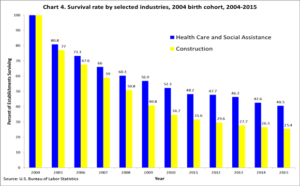Entrepreneurs in the United States: A Dying Breed? … Or Alive and Well?
Every time we turn around, it seems like one more mom and pop store has been swallowed up by a mega corporation. Some say that this spells the beginning of the end – the death of entrepreneurship in the US.
But the numbers tell a different story.
A Remarkable Recovery
2008 – 2009 spelled a dark time in the world economy. Heralding the biggest financial downturn the world has faced since the early 1920s, this period has been given the euphemistic label “The Great Recession“.
It is interesting to note, though, just how quickly we in the U.S. have recovered from this catastrophe. In fact, the 2014 GEM* report shows that the U.S. economy recovered faster than most developed economies in the world.
The report calls the USA “… the most robust performer among developed economies in 2014 …“.
By the end of 2014, the U.S. economy had already created more jobs than during any other year since 1990. And unemployment fell by a full percent.
So why did the U.S. recover so well?
The short answer? Entrepreneurs saved the USA. Since 2009, fewer firms have closed than people have been born. This means that when a new business starts, there is a good chance it will last.
This stat doesn’t just affect start-ups. The number of established firms has grown too, as a result. The number of new ventures launched each year has grown steadily – though not as fast as the total number of businesses in operation.
Attitudes to Entrepreneurship in the USA
Success starts with the right attitude. This is true both for those launching start-ups, and those that support them. You need a good attitude to start a business. And you need a support system that will build you up … people who care enough to help pick up the pieces when challenges arise. And arise they will.
At its heart, the United States is an entrepreneurial country. But what does that mean in real terms? It can mean:people taking part
- people taking part at different phases of the process
- entrepreneurs who impact society in a range of ways, and
- attitudes to entrepreneurship in the society overall. A good attitude makes a fertile environment for business growth.
This is good news for the U.S., because:
- 76% of Americans see positive images of entrepreneurs in the media.
29% of Americans personally know at least one entrepreneur.
The report* states, “Opportunity perceptions are high in the United States (51%). For the first time since GEM has tracked entrepreneurship, more than half the U.S. population believes good opportunities exist for starting businesses.”
How do we compare?
No two economies are alike. Many can be grouped broadly, though, based on how developed they are – and their level of growth.
Each type of economy comes with its own set of business trends. In what are known as efficiency-driven economies – economies in which economic activity is based on necessity and survival – entrepreneurship is high. This is to be expected. There just aren’t a lot of options for ways to earn money. People have to work for themselves to make ends meet.
But in more developed countries like the U.S., entrepreneurship faces a good deal of competition from more traditional forms of employment. There are more jobs – and more options. Many of these are seen to be stable – and they come with great benefits.
Not only that – in a wealthy economy firms tend to be mature and established. This makes them competitive. Thus, it can be very difficult for newcomers to gain market share.
So the rate of entrepreneurship tends to be lower, on average.
Even so, our economy shows one of the highest rates of entrepreneurship among developed economies – 14%.
Good Intentions
Starting and growing a business is a process. When we look broadly at all the phases in this process, we see an interesting trend in the U.S.:
For every 10 people who talk about wanting to launch a start-up in the next three years, eight people are getting started.
To put this into perspective, in most efficiency-driven and innovation-driven economies, around four people start for every 10 people who intend to do so.
Most Americans who want to start a business – do.
There are three factors that translate intentions into actions when we want to start a business:What we perceive our capabilities for starting a successful business to be (how good we think we are);
- What we perceive our capabilities for starting a successful business to be (how good we think we are);
- Not being deterred by fear of failure (can we pick ourselves up, dust ourselves off, and carry on?), and
- The belief that being an entrepreneur is a good career choice.
Americans have a higher than average score for these factors than other innovation-driven economies. In fact, Americans tend to behave more like those in efficiency-driven economies.
We tend to have confidence in our abilities to launch a start-up – and make it work. We are willing to take the risks that will let us succeed. And we believe that starting a business is a good idea.
In short: we have the ingredients that lead to the growth of entrepreneurship in a society.
Going it alone
Being self-employed often means being alone – at least at first.
What the stats tell us about entrepreneurs:
- 55% launch with no co-founders
- 35% expect to hire 6 or more people in 5 years
- 23% launch in teams of 3 or more
- 76% of those that launch in teams expect to hire 6 or more staff in 5 years
That can be scary. Starting a business by yourself is lonely. There is no one you can bounce ideas off. No one to help pick up the slack. No one to push you to perform at your best – or support you when you need some downtime. Tough choices are never easier when there’s no one there to help you make them.
But starting with a partner – or, more so, a team – is costly. Wages need to be paid. Profits need to be shared. And if they don’t have any more experience than you do, it can be hard to justify the extra costs.
Now, you don’t have to start on your own.
For just $49.97 per month, you can launch your start-up – or grow your business – with a team of experts by your side.
We have decades of combined experience in:
- launching a start-up that lasts
- starting and growing a business
- online marketing that works
- branding that makes an impact
We can take the guesswork out of your strategy – and improve your chances for success … All for less than it costs to take a friend to the movies.
* GEM – the Global Entrepreneurship Monitor – aims to inform academics, educators, policy-makers, and practitioners about the nature of entrepreneurship and its proliferation across economies around the world. GEM also aims to foster understanding, support, and conditions that allow entrepreneurship to thrive. The annual GEM report seeks to advance knowledge about the multidimensional nature of entrepreneurship in the United States, with comparisons to other economies and insights on longitudinal changes over time.














